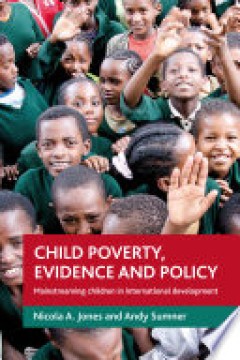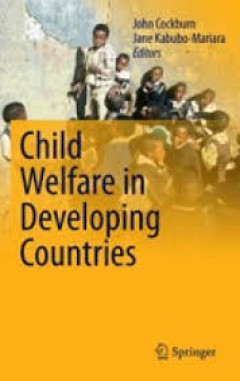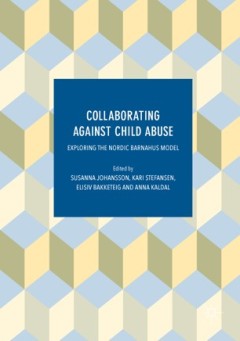Filter by

Child Poverty, Evidence and Policy
This book is about the ideas, networks and institutions that shape the development of evidence about child poverty and wellbeing, and the use of such evidence in development policy debates.
- Edition
- -
- ISBN/ISSN
- 9781847424471
- Collation
- -
- Series Title
- Mainstreaming Children in International Development
- Call Number
- 362.7091722 JON c

Child welfare in developing countries
What factors affect child welfare? How can policy improve child welfare? In developing countries, there has been relatively little empirical work on the analysis and measurement of child poverty. Further, poverty has many dimensions, including mortality, morbidity, hunger, illiteracy, lack of fixed housing, and lack of resources, and cannot be assessed with a single measurement method. Based…
- Edition
- -
- ISBN/ISSN
- 9781552504888
- Collation
- x, 298 p.
- Series Title
- -
- Call Number
- 362.7091724 CHI c

A Philosophical examination of social justice and child poverty
This book examines child poverty as a topic of social justice. The authors develop a theory of social justice for children based within the capability approach, apply it to the injustice of child poverty and propose a theory of the responsibilities of different agents towards children living in poverty. Das Buch behandelt Kinderarmut als Thema der sozialen Gerechtigkeit. Ausgehend von einer…
- Edition
- -
- ISBN/ISSN
- 9781137426024
- Collation
- 206 p.; 22 cm.
- Series Title
- -
- Call Number
- 362.70869942 SCH p

Collaborating against child abuse : exploring the Nordic Barnahus model
This edited collection explores the background and implementation of the Nordic Barnahus (or 'Children's House') model – recognised as one of the most important reforms related to children who are the victims of crime in the Nordic region. This book discusses both its potential to affect change and the challenges facing it. The model was introduced as a response to a growing recognition of th…
- Edition
- -
- ISBN/ISSN
- 9783319583884
- Collation
- xxxii, 384p. : ill.
- Series Title
- -
- Call Number
- 362.767 COL c

Child protection in England, 1960-2000 : expertise, experience, and emotion
This open access book explores how children, parents, and survivors reshaped the politics of child protection in late twentieth-century England. Activism by these groups, often manifested in small voluntary organisations, drew upon and constructed an expertise grounded in experience and emotion that supported, challenged, and subverted medical, social work, legal, and political authority. New…
- Edition
- -
- ISBN/ISSN
- 9783319947181
- Collation
- ix, 215p. : ill.
- Series Title
- -
- Call Number
- 362.70942 CRA c
 Computer Science, Information & General Works
Computer Science, Information & General Works  Philosophy & Psychology
Philosophy & Psychology  Religion
Religion  Social Sciences
Social Sciences  Language
Language  Pure Science
Pure Science  Applied Sciences
Applied Sciences  Art & Recreation
Art & Recreation  Literature
Literature  History & Geography
History & Geography